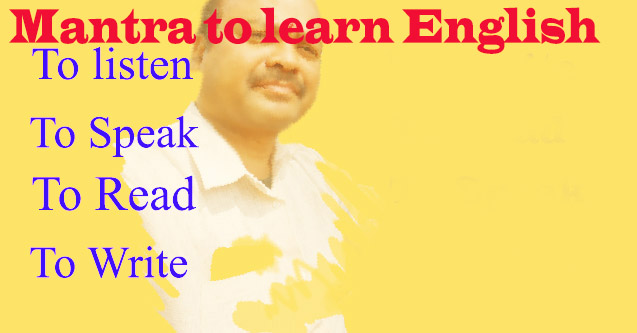More than 25 years have passed since I started teaching English to young minds. Before I move further, I must state that the area (Bastar region) I belong to is known as backward in terms of education, knowledge and approach.
Now, the state government (Chhattisgarh) is making every possible effort to teach the students English with a view to competing with others living across the country.
Basic English is really a challenge to all the teachers as it has plenty of queries to be answered.
This blog aims to talk about the way which I understand is the finest way to learn English. There are three formulas (Mantra) following which one can learn not only English but also any language on the earth.
They are-
To listen
To Speak
To Read
And
Write
One can prioritize them as per the need and drawback one feels. For example;
If you are weak at pronouncing words you must start from third points (i.e. to read) irrespective of the facts you are pronouncing them wrong or right. While listening you can remove your problems in pronouncing words. Now, questions arises what to listen and where to listen. Answer is very simple. There are a lot of audio/ videos clips that would help you to do so.
When it comes to other formula i.e. "To speak" this will help you to remove the hesitation that creeps into you while speaking.
"just go on speaking or leading stuff"
When it comes to other formula i.e. "To speak" this will help you to remove the hesitation that creeps into you while speaking.
"just go on speaking or leading stuff"
This practice can be termed as jowl-exercise and I understand this comes first for those who want to learn how to speak English.
While others may start from LISTENING first if they feel they can’t understand how the language is spoken.
Well, the priority of the points can vary as per the need and demand of the students.
But long and short of it is that one must speak-listen, read-write. Scholars say-you can’t learn how to swim unless you get into the water. Similarly, you cannot learn how to speak unless you follow the points mentioned above. I don’t know whether you agree with me. But it’s a fact.
To know another one in Hindi on the Same Topic, please click the link below:
अंग्रेजी कैसे सींखें ?
In the course of my teaching and learning, many have made comments that one must have an ambiance around oneself to learn the language.
I entirely wouldn’t agree to it as it is up to to the learner who could create the ambiance of his choice. I am born and brought up under typical Hindi speaking ambiance and most of my teacher used to speak local dialects to make the stuff clear when I was in school. However, I learnt and I didn’t go to any coaching classes as I see the present generation is doing to learn it.
Another mantra is that one must keep thinking about the dialogues what he is supposed to speak in one’s native language.
As per the IPA (International Phonetic Alphabet) certain words are pronounced in a set format.
 |
| Phonetics hassles |
Let’s take an example of the letter “U” and find out the way it is being pronounced.
They either “ o̅o̅ “ or ŭ” and “ə”
Now, the questions which beginners often asked are that
“Why are PUT, CUT and BUT pronounced in a different way when there is a difference of just one letter e.i. ‘P’ and ‘C’ or “B”?
We have been asked plenty of such questions based on the phonetics and pronunciation when I had spared little time at Jawanga in district Dantewada.
Please read my blog “Travel from Dantewada to Sukma” for details.
There are so many such queries that need to be answered. Experts say all comes down to the knowledge of phonetics. As you go on reading, listening and speaking you would come to know about their pronunciation.
Slowly you will pick up good English.
There are a few suggestions from scholars. They are as under:-
- Read whatever you catch hold of Like books, magazines, booklet, pamphlet, bills advertisements, sale papers, and keep a copy of the dictionary with you.
- Make it a point to read at least one page per day of them, that's a good start for the beginners. Try to look up word-meaning and make sentences of your own using them.
- Check all English news to see how they present the same news in a different way. Try to grasp their style of making sentences to learn the syntax.
- Then, begin to speak at intervals. I believe the translation of books will help you a lot.
Slowly you will pick up good English.
I hope this blog on learning English is helpful to the beginners
Till the next blog
See you soon ! bye bye!
Please Do read my next blog on Nursing; One of the promising career







13 Comments
It is indeed a nice article..awaiting for part 2 😊😊
ReplyDeleteIt will come soon! Thanks for your comment Shailesh Ji !
ReplyDeleteKeep writing Sir...
ReplyDeleteThank you Bastar Sewak Mandal for the encouraging words!
DeleteReally helpful for those who are willing to improve. Nice work sir.
ReplyDeleteThank you Muqit Sir! Keep reading and encouraging me with your words!
DeleteNice information.like to read more.As an English teacher I would like information about symposium.What should I present as a teacher of secondary.Plz help me.
ReplyDeleteNikumbh Sir! Thanks for your kind words! There are many topics that can be presented as a part of symposium. Like child psychology. I am planning to write blog on the topic.
DeleteQuality Experience always talks and that is very clear through yours valuable texture.
ReplyDeleteIt's a real appetizer for newcomer.
Please do write something more.
Thank you very much! I hope you have read my other blogs too.
DeleteLearning and understanding English is the necessity of this generation. SO the most of the parents admit their children to the English medium school, so they can learn English from their childhood.
ReplyDeleteI agree with you. Thanks for your comments English Speaking Classes !
DeleteWonderful Mantras for learning and teaching ! Very useful!!
ReplyDeleteAwaiting your comments!